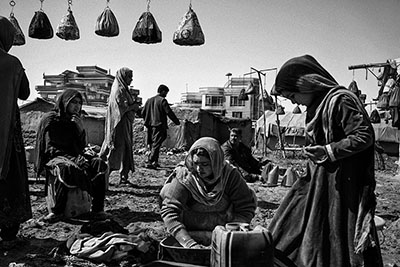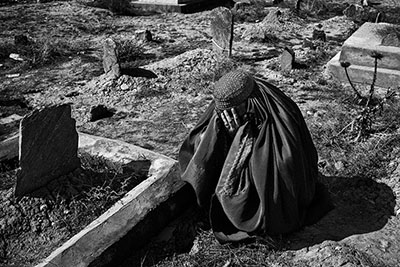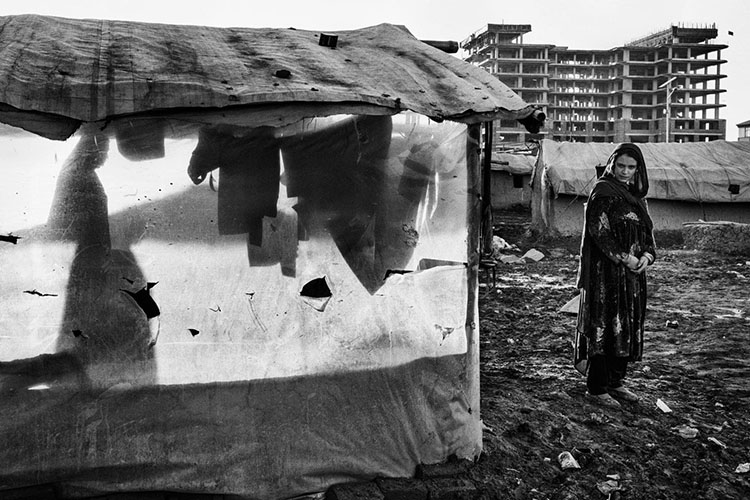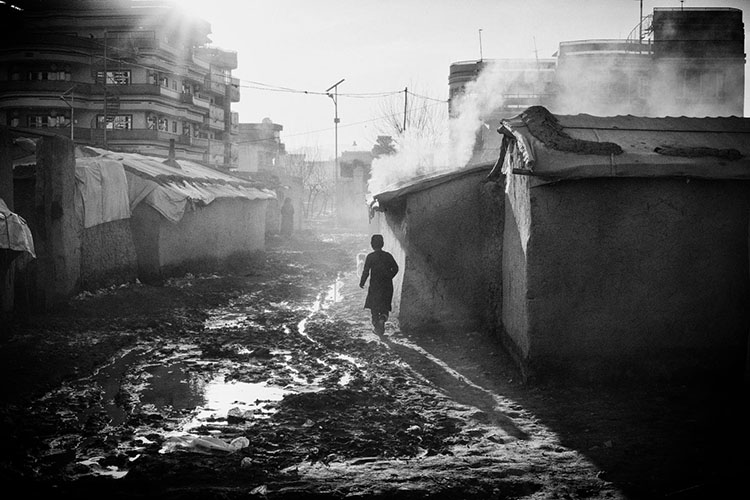The Washington Post, May 28, 2019
Hardship and survival – the daily struggles of internally displaced people in Afghanistan
She washes clothes, cleans people’s houses and looks after those who are ill to earn a couple of dollars a day, enough to guarantee some food to the children
By Francesca Recchia & Lorenzo Tugnoli

Khal Bibi, center, washes clothes outside her mud house in the Hussain Khail informal settlement. She has lived with her two children in a hut since she lost her husband and a daughter in an airstrike in the northern district of Kunduz. (Photo: Lorenzo Tugnoli/Contrasto)

Khal Bibi sits near the grave of her husband in Kabul. (Photo: Lorenzo Tugnoli/Contrasto)
Khal Bibi is a 23-year-old widow. Her family has been destroyed by the 18-year war that afflicts Afghanistan. Bibi’s husband and one of her three children were killed in an airstrike during clashes between government forces and the Taliban. She, with her remaining two children, is among the 550,000 internally displaced people who have been forced to flee their villages.
While negotiations as part of the peace process are underway, war in Afghanistan continues, and more than half of the country is contested between government forces and the Taliban or the Islamic State. The impact of war on the civilian population is devastating. According to the United Nations, more than two-thirds of the population lives in areas affected by the conflict. Informal settlements and improvised refugee camps have multiplied — there are 54 of them in Kabul alone, with thousands of people living in precarious conditions.
With a tragedy of such scale, the risk of forgetting the people behind the numbers is high. Last February, photographer Lorenzo Tugnoli, a frequent contributor to The Post, wanted to show the dignified faces behind the statistics.
It had been a freezing winter in Afghanistan: good for the parched earth after a year of drought, but disastrous for thousands of refugees across the country. The 160 families who live in the Hussain Khail camp on the outskirts of Kabul have been there anywhere from 10 years to 10 days; knee-deep in freezing mud, they watch life go by. They all belong to the same clan and come from different villages in Kunduz province. Caught in the crossfire between the Afghan government and the Taliban, they had no choice but to flee — victims of an advancing front line, taken by surprise by the disasters of war.
For them, the future is a mirage: Many are without official documents, making them disappear in a mist of bureaucratic despair. Bibi is one of them. Her concern about the present is that her children get something to eat.
When we met her, Bibi had just arrived in the Hussain Khail camp after a bomb killed her husband and daughter. They were in the yard, while she was inside their house with the other children. The bomb fell in the courtyard; the wall of the house protected half of the family, but for the other half there was no escape. In the explosion, shrapnel hit her in the right thigh, passing through; she was losing a lot of blood and there was no time to wait for help. She blocked the hemorrhage with her hijab while looking after the two little survivors, who were both untouched except for the scars that such experiences carve into the soul. She collected the remains of her husband and daughter and waited — with her whole family — both the dead and the living, for two days. Until a truck came to take them away, to Kabul, to join other members of her clan. Bibi took her dead along and buried them in a cemetery not far from the camp.
She washes clothes, cleans people’s houses and looks after those who are ill to earn a couple of dollars a day, enough to guarantee some food to the children, but not enough to pay for the medicines that her son would need. Besides feeding him and hoping he’ll heal, there is not much more she can do.
For Bibi, as for many refugees, life is suspended in a never-ending present: They wait for time to pass and head toward an unclear future.

Most of the people in the camp come from the northern province of Kunduz. Intense fighting between the Taliban and the Afghan army forced them to leave the area. (Photo: Lorenzo Tugnoli/Contrasto)

A muddy road in the Hussain Khail informal settlement on the outskirts of Kabul. (Photo: Lorenzo Tugnoli/Contrasto)
Characters Count: 5130
